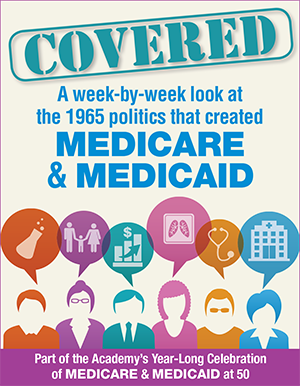Bob Rosenblatt, Special Correspondent
Throughout 2015, the Academy is working with partners to create a platform for dialogue around the history and future of these two vital programs, including this weekly Covered blog series. Covered is written by Bob Rosenblatt, a Senior Fellow at the National Academy of Social Insurance and editor of the website HelpWithAging. Learn more about the Academy’s celebration of the 50th anniversary of Medicare and Medicaid.
Senate Finance Committee Attacks White House on Medicare Bill
June 19, 1965
By Bob Rosenblatt, Special Correspondent
Washington, DC – The Senate Finance Committee this week delivered a major blow against the Administration’s Medicare program, passing amendments that would change it radically from a hospital program for people over 65 into a costly welfare program for the poor. Led by Sen. Russell Long (D-LA), a member of the Democratic leadership in the Senate, the committee approved amendments that would drop from the proposed legislation any time limits on hospital stays and home care and make higher income people pay a greater share of their hospital bill.
The Johnson Administration said it will try next week to reverse the Long amendments while the bill is still in committee.
Long’s amendments, approved on June 17, change the premise of the bill sought by the Administration. “The whole principle of Social Security is violated,” said Sen. Clinton B. Anderson (D-NM), the lead sponsor of the Senate bill introduced for the Administration. Under House Medicare bill everyone over 65 who paid the additional Social Security payroll tax dedicated to the Medicare program would have coverage for up to 60-days of hospital care per episode of illness, regardless of income. Coverage also would include 100-days of home care visits by medical personnel. Eligible individuals would pay a $40 deductible for the first 60-days in the hospital.
Sen. Long claimed his amendments would be more generous to the needs of poor people suffering from catastrophic illnesses by giving them potentially unlimited coverage. But the result could dramatically increase total spending for the bill, eroding support in Congress for the whole enterprise. Long’s amendments could essentially transform Medicare from a social insurance program to a welfare program, according to many observers. Long’s approach looks at hospital care as welfare, something people can get for free if they are poor enough, while others must pay a rising share of the bill, depending on their income.
The first of Long’s amendments was approved by Finance Committee in an 8-6 vote. The second amendment would impose an income test to determine how much a hospital stay would cost. It was approved by the committee in a 10-3 vote.
The Long amendments would have the Medicare program work like this:
- An individual with an annual income of $400 or less would pay a deductible of $20 for a hospital stay.
- An individual with an annual income greater than $400 but less than $1,000 would pay a five percent income surcharge, in addition to a $40 deductible.
- An individual with an annual income greater than $1,000 but less than $2,000 would pay a six percent surcharge on income above $1,000 and a $50 deductible.
- An individual with an annual income greater than $2,000 a year would pay a seven percent surcharge on income over $2,000 and a $110 deductible.
This means that an individual with an income of $10,000 or more would not qualify for any benefits unless their hospital bill was $670 or higher. According to Administration experts, the average hospital bill is approximately $600.
If Long’s amendments are approved by the Senate, it may set up an unusual political dynamic, with some Senate leaders working with the Johnson Administration seeking to accept the House version of bill. But many Senators may wish to keep the Senate bill with the Long amendments – revealing a Democratic party divided along regional and ideological lines. Sen. Harry Byrd (D-VA), chairman of the Senate Finance Committee, for example, has never been a supporter of the Administration’s Medicare proposal. He showed tepid support for the Administration’s proposal during an unexpected meeting with reporters at the White House on March 26th. Byrd promised merely that the committee would hold thorough hearings on the bill.
The social insurance approach has been a long-time goal of liberals but seemed possible after the 1964 election added to the number of liberal Democrats in Congress. Now, the liberal legislation favored by the White House is in jeopardy unless it can persuade the Senate Finance Committee to reverse the June 17th votes and reject the amendments placed in the bill by Sen. Long.
► Directory of COVERED posts
► Read the next post in the COVERED series, “Finance Committee Restores Medicare bill, AMA Chief Calls Off Docs”
► Learn more about the Academy’s celebration of the 50th anniversary of the enactment of Medicare and Medicaid

